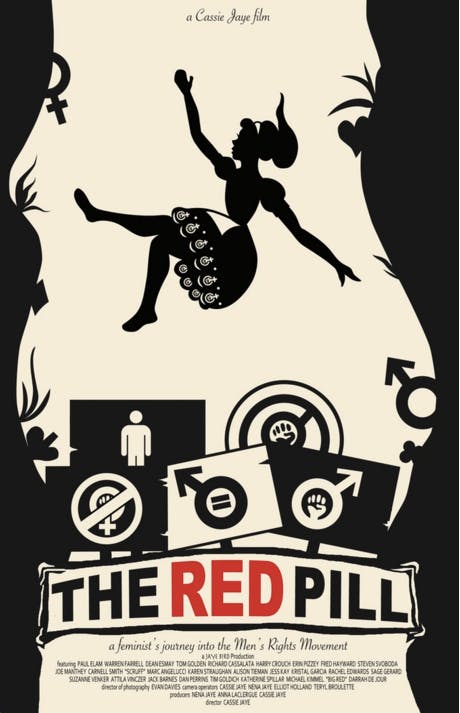“You must be a misogynist.”
This is how Dean Esmay, a prominent men’s rights activist (MRA), characterizes the general response to the men’s rights movement. Also referred to as the “manosphere” online, the Southern Poverty Law Center described the men’s rights movement like this:
“… peopled with hundreds of websites, blogs and forums dedicated to savaging feminists in particular and women, very typically American women, in general. Although some of the sites make an attempt at civility and try to back their arguments with facts, they are almost all thick with misogynistic attacks that can be astounding for the guttural hatred they express.”
It’s a characterization that sounds spot-on to some feminists, while MRAs claim it’s a misperception of their beliefs that needs to be debunked. And they’re doing it with the help of self-proclaimed feminist.
Cassie Jaye is a Los Angeles-based filmmaker whose documentary about the men’s rights movement, The Red Pill, is breaking all fundraising expectations through its Kickstarter campaign. At the time of publication, Jaye has raised $174K from an original $97K goal.
In an interview with The Daily Dot, Jaye attributed her own feminist awakening to arriving in L.A. at age 18 to be an actor. She quickly found herself cast in stereotypical roles for young, attractive women: “I was always the vixen, or the cute girl-next-door who always died in horror films,” she said.
Jaye also encountered the sleazier side of male power in Hollywood. She recalled times when “the producer or director wouldn’t cast me, but would then ask me out, or insinuate that ‘if you come out with me, maybe you’ll get the role’. The casting couch, basically.” Sticking up for herself and complaining about this type of treatment of women in Hollywood is what Jaye says marked the beginning of her identifying as a feminist.
After acting in bit parts on The O.C., Alias and Entourage, Jaye formed the production company Jaye Bird Productions in 2008 with the help of her family. Her two previous documentaries, Daddy I Do and The Right to Love, focused on abstinence-only sex education and the fight for gay marriage, respectively.
The 29-year-old said she learned about men’s rights websites while researching the concept of rape culture following the high-profile Steubenville and Delhi rape cases. Instead of focusing on rape culture specifically, though, she decided to train her camera’s lens on the men who so vocally speak out against feminist activism to change that culture.
The current stereotype of a MRA is an embittered, socially awkward, middle-class, usually-white man who either figuratively or literally “lives in his mother’s basement.” In other words, he’s never been successful in forming romantic relationships, and has taken up the cause of men’s rights to blame women for his own coronation in loser-dom.
Here’s somewhat good news: Throughout her filmmaking Jaye found that the men’s rights movement has diffuse aims and supporters. Some are happy with the widely used title MRA, while others who reject the label. Some are blatantly misogynist, while others are not.
“MRAs would say the gender revolution needs to be looking at men’s issues without blaming men for them,” Jaye explained, summarizing the culture’s general beliefs. Some of the specific issues which appear regularly on men’s rights websites and forums include custody rights, male victims of domestic and sexual violence, workplace fatalities, false rape accusations, and boys underperforming in schools.
Oh, and the evils of feminism.
Paul Elam writes on his prominent men’s rights blogs, A Voice for Men, that feminism “foments hostility between the sexes with victim narratives and false statistics.” A Voice for Men has (at times viciously) criticized Feministing.com co-founder Jessica Valenti, MSNBC commentator Zerlina Maxwell (who is quoted in The Red Pill trailer), and numerous other high profile feminist activists and writers.
However, Jaye insisted that viewing the whole men’s rights movement as anti-feminist is an oversimplification. “A lot of the issues [MRAs are concerned about], I think feminists would agree are issues,” she told the Daily Dot. “Where they differ is why they are issues. Feminists would say it’s because of patriarchy. …MRAs do not believe we live in a patriarchy.”
Jaye began working on The Red Pill in 2013. Marketing materials imply that her own gender politics underwent a transformation during the making of the film, which is now in post-production. The Kickstarter page for The Red Pill even teases that after filming, “she would never see the world the same way again.” But to the Daily Dot, the filmmaker spoke more elliptically.
“Before making The Red Pill, I probably would have thought ‘Wow, some of these comments are absolutely insane,” Jaye said. “[Now] I understand a bit more of why they’re saying what they’re saying. I’m not saying I agree with all that’s said, but I do have a lot more understanding of where they’re coming from.”
It’s not hard to understand why the men’s rights movements and the characters within it could capture the attention of a documentary filmmaker.
Jaye struggled to find individual financiers who did not have an agenda, she said. Instead, she mostly encountered people who “thought the [men’s rights movement] was this disease that shouldn’t be given a fair hearing.” She failed to win any grants from film festivals, and wrote the following in a Reddit Ask Me Anything session:
“I started to see the bias towards women’s films and against men’s [at film festivals]. There are no categories for men’s films though there are several for women and minorities.”
But Jaye was happy to find success with Kickstarter (which she called a last resort.) The project has hit every fundraising goal that Jaye has set, hitting its first target of $97,000 on October 27, and then a “stretch target” of $114,000 only a few days later. She is very close to hitting a second stretch target of $175,000.
The Kickstarter for The Red Pill received a large helping hand in reaching its initial target from Mike Cernovich, anti-feminist author of Gorilla Mindset: How to Control Your Thoughts and Emotions to Live Life on Your Terms and men’s rights movement supporter. Cernovich’s Twitter activity is gleefully controversial: He repeatedly uses the word “faggot,” often disparagingly tweets about SJWs (social justice warriors), and spent the better part of the past few weeks tweeting about the liberal-minded actor Seth Rogen, his wife and their sex life (or lack thereof) under the hashtag #CuckRogen.
Nevertheless, Cernovich pledged $10,000 to The Red Pill‘s Kickstarter project, thus earning himself an Associate Producer credit. This itself may be controversial for some MRAs, and in an October 29 blog post entitled “Why I pledged $10,000 Towards a Documentary Directed By a Woman,” Cernovich (who does not identify as an MRA) clarified, “I am not funding The Red Pill to help MRAs. The Red Pill will help all men, and all women, and all children.”
After receiving social media criticism for letting a woman “speak for” the men’s rights movement, Cernovich tweeted in response “Guys wanna complain I gave to a woman’s Kickstarter. Where was YOURS? Exactly. Go create!”
https://twitter.com/Cernovich/status/659178701423296512
The title of The Red Pill is a reference to The Matrix, where taking “the red pill” is a metaphor for “seeing the painful truth of reality.” Throughout her film, Jaye refers to the red pill as a representation of the men’s rights movements’ beliefs, while the blue pill represents feminism. However, Jaye insists her documentary will not be biased in favor of the men’s rights movement, and the title is merely reflecting the way movement supporters classified their beliefs.
“They would say they had a ‘red pill moment’ of realization,” she explained. “It’s just the symbolism I use within the film to distinguish between them.”
Jaye has also emphasized that The Red Pill is not a reference to a subreddit named The Red Pill, a pick-up artist (PUA) community on Reddit that encourages men to reclaim their masculinity through sexual conquest. Although many would see similarities between the two communities, MRAs and PUAs are distinct groups and are often keen to distance themselves from the other.
Female supporters of the men’s rights movement are also interviewed in The Red Pill, but Jaye acknowledges that the majority of men’s rights supporters she interviewed were white, straight men. (She did identify one bisexual man and a couple of men of color.) She did, however, point out that the backers for the Kickstarter have been diverse and have included feminists, adding, “Our five highest backers … are neither MRA nor feminist. I would say three out of five of them didn’t even know about [the men’s rights movement], but wanted to defend free speech.”
The pressure is on to honor the fair-and-balanced promises of the Kickstarter, but Jaye was emphatic to the Daily Dot that the story being told will not be altered by the film’s backers or producers, like Cernovich. The sudden social media attention, she said, was a good litmus test for the film’s reception: “It’s interesting to know what kind of resistance is out there.”
Illustration by Max Fleishman



